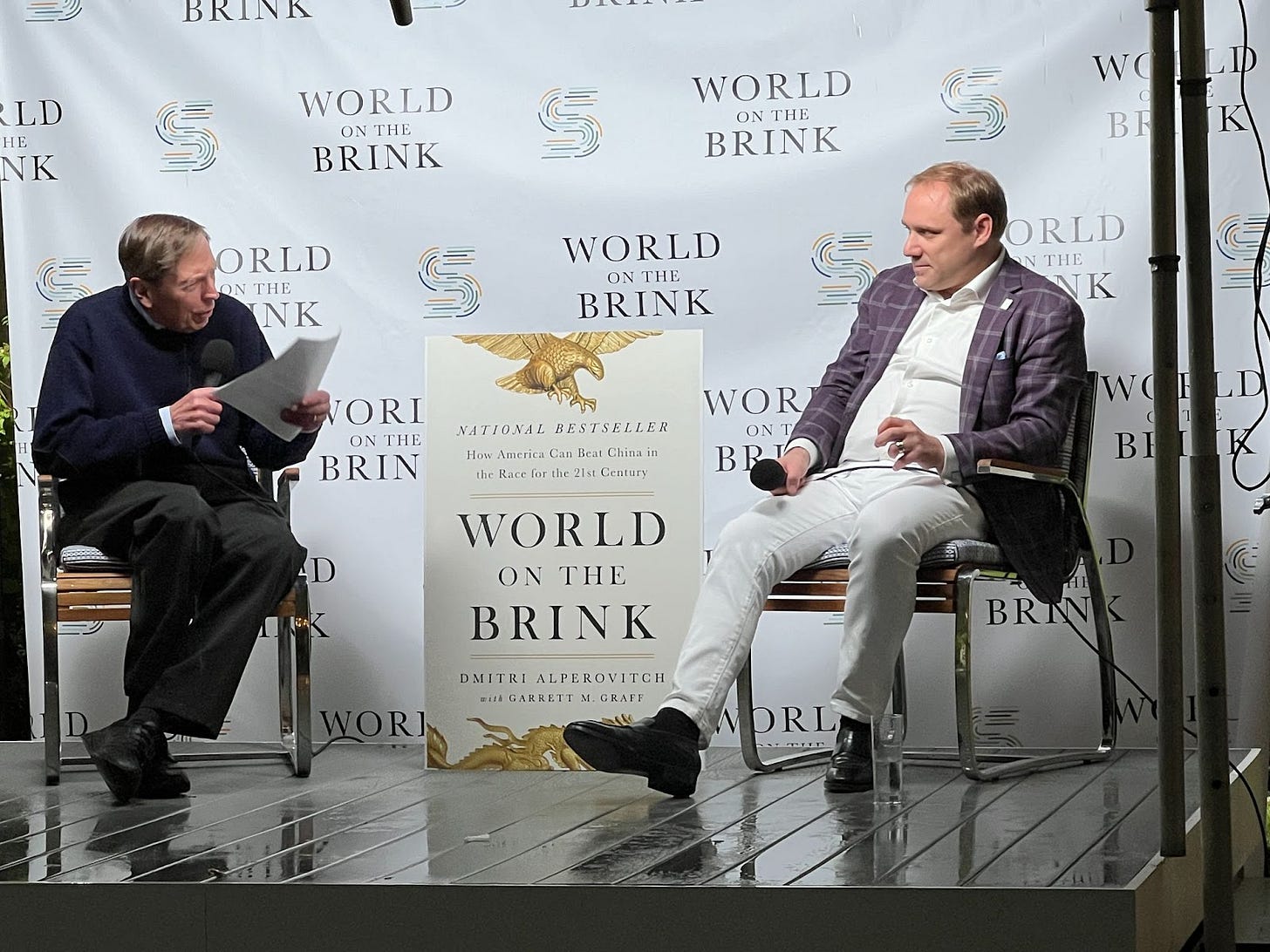Alarm bells over cocktails: Saturday night with ‘tech titan’ Dmitri Alperovitch

So long as there is instability, competition, and wars, there will be books -- and in the Washington, D.C. region, that means book parties. On Saturday night, it was Dmitri Alperovitch’s turn.
His book, World on the Brink: How America Can Beat China in the Race for the Twenty-First Century, has already become a bestseller. It is a marked shift from what made the so-called “tech titan” widely known. He was the co-founder and former Chief Technology Officer of CrowdStrike, a multibillion dollar cybersecurity firm that found the Russians hacked the Democratic National Convention in 2016. Former President Donald Trump invoked Crowdstrike in his infamous call with Ukrainian President Volodymyr Zelensky, fast-tracking Trump’s first impeachment. But for Dmitri, the contents of that call led to death threats and extra security precautions. As a target of the far right, the danger still ebbs and flows for him.
But on Saturday night, we were all in cocktail attire, toasting him against the rain. His guests included CIA Deputy Director David Cohen, Deputy Attorney General Lisa Monaco, and Wonder Woman star Lynda Carter. With the party located near CIA headquarters, former CIA director ret. Gen. David Petraeus joked that the agency’s deputy director was there “just to make sure we don't rush the fence.”
The conversations hewed closely to the site. Alongside the usual DC networking, clever quips, and personal life updates, there was talk of the grimness of Israel and Gaza. And fears that a controversial but essential foreign surveillance program called Section 702 could die in a Trump presidency, since Congress took the rare step of reauthorizing it for two years instead of the usual five. Then NBC News’ Andrea Mitchell asked Dmitri, on stage, if Russia would win the war on Ukraine. He said Russia has already lost -- lost its Soviet military inheritance as well as its trained personnel -- but that Ukraine may not win.
Dmitri knows a great deal about Russia. Back in July, standing against the green ridges of Aspen during the Aspen Security Forum, he told me how Russian forces had adapted to the war with minefields, anti-tank traps, and trench lines. That new Ukrainian brigades, with just six weeks of training, were taking heavy losses. His observations presaged a Ukrainian counter-offensive that sadly saw little return of its bruised and stolen land.

Dmitri was born in Moscow, but moved to Tennessee as a child. He earned a degree in information security from the Georgia Institute of Technology, patented dozens of technologies for things I honestly cannot explain (“Reputation based load balancing” anyone?), and co-founded the Silverado Policy Accelerator -- a nonprofit organization named after an 1850s-era trail through Napa Valley, which brought new opportunities to California. The think tank is focused on trade policy, cybersecurity, and economic/ecological security. It strives to work in the rare areas that still attract bipartisan support.
Which brings us to China, and the book Dmitri co-wrote with journalist and historian Garrett Graff. “I don't have solutions for our political morass,” Dmitri told us from the party’s stage, as crab cake hors-d'œuvres came around. “The one thing I'll say is that as broken as things are down there in D.C., the one thing that unites people is China.”
I asked him if he thought China would remain a bipartisan concern, in a phone call the day after the party, from which both of us admitted we were still recovering. I asked if Congress’ slow passage of military aid to Ukraine was any indicator of where China could one day fit across the political aisle. “Anything is possible,” he said. “I think it's very unlikely.”
“I think there's a universal appreciation that China is a threat on both sides of the aisle,” he continued. “We're seeing their coercion in the economic sphere, both against other countries and including against companies here -- like hotel chains or airlines that dare to mention Taiwan on their websites, or the NBA, when they express opinions about Chinese human rights abuses. Because it's so in our face every single day, I think it's very hard for anyone to change their opinion. Not just the political leadership, but really of Americans that have turned on China as well in the last four or five years.”
Dmitri’s focus on China started in 2010, in the wake of “Operation Aurora.” China had just hacked Google and other large companies, leading Dmitri into a space between cybersecurity and geopolitics that would only expand with time. It may not have been clear then, but China would become the world’s largest thief of intellectual property, committing what Dmitri has called the greatest transfer of wealth in history.
“We are on a path to war here,” he told me. “The likes of which we have not seen since World War Two. Potentially even more devastating.”
If that sounds dramatic, know that he has briefed the intelligence community and served as a special advisor to the Department of Defense. He is still involved in safety and advisory roles for the Department of Homeland Security.
And he believes the roughly $4 billion in weapons funding for Taiwan, which Congress passed in April, has symbolic importance. “The Chinese have very active propaganda that is resonating frankly with a percentage of the population in Taiwan -- that America just wants to sell weapons, supplies, platforms to Taiwan and at the end of the day, it is not a reliable ally and will abandon the Taiwanese at the first opportunity.” He says the aid package helps to convince Taiwan that its defense is not simply a money-making endeavor for American defense contractors.
In writing the book, Dmitri traveled to Taiwan. He walked its mountainous, rugged terrain and met with the country’s leadership, including President-elect Lai Ching-te, who is set to be inaugurated on May 20. He says Taiwan is “totally defendable,” “a natural fortress.” If China were to invade, he says it would likely conduct an airborne assault, and require port facilities and airfields -- a feat that would demand hundreds of thousands of troops and deep logistics. After all, we’re talking about an island of some 24 million people.
The question is whether Taiwan’s forces would fight. Dmitri told me they would -- if they believed in the possibility of victory and if China displayed brutality as it invaded. He says those two factors motivated the Ukrainians when Russia began its full-scale invasion in 2022.
Promoting World On The Brink, Dmitri told his guests that like Vladimir Putin, Xi Jinping is in the twilight of his power. And both men want to conquer more territory… for the history books.


